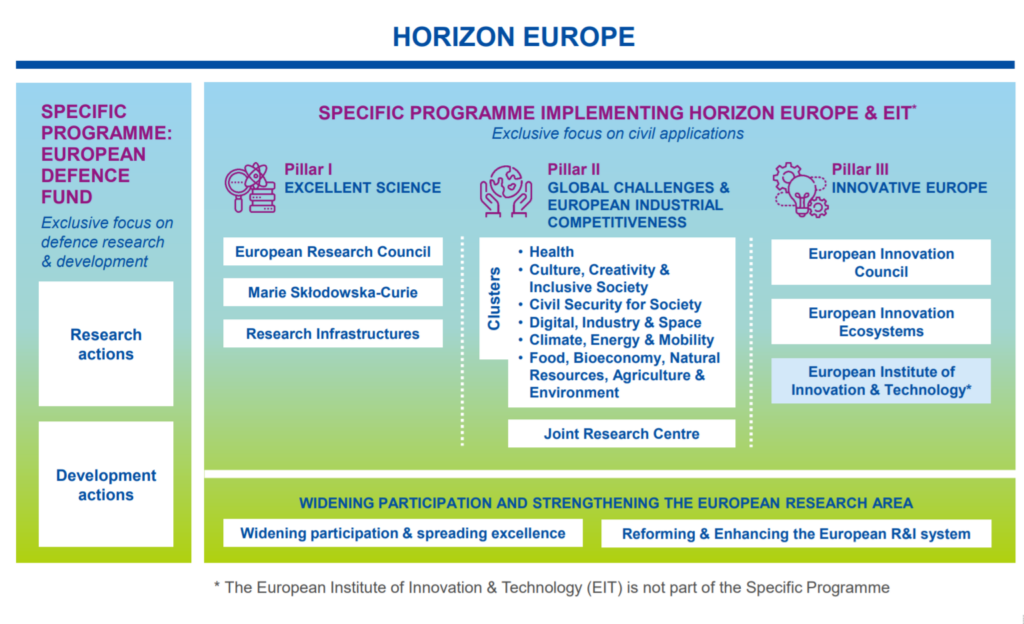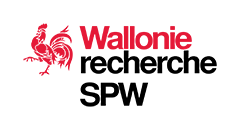Horizon Europe
The future growth and prosperity of Europe relies on its ability to remain a global leader in research and innovation.
Horizon Europe, the 9th European framework programme for research and innovation, was launched in February 2021 under the Portuguese presidency of the Council of the European Union. It has a budget of €95.571 billion for the next seven years (2021– 2027). A follow-up to Horizon 2020, it aims to significantly contribute to bolstering the science and technology sectors within the European Union, in order to enable it to meet global challenges in crucial fields such as health, ageing, security, pollution and climate change.
In order to continuously stay on track between the priorities of the European Union (a green, climate-neutral Europe, a digital Europe and a resilient Europe), the European Recovery Plan and Horizon Europe, the European Commission has developed a strategic plan in conjunction with the member states.
It was approved on 15 March 2021 and defines the Key Strategic Orientations for research and innovation in Europe, and the expected impacts, for the first four years of the framework programme (2021–2024):
- KSO 1 ‘Promoting an open strategic autonomy by leading the development of key digital, enabling and emerging technologies, sectors and value chains to accelerate and steer the digital and green transitions through human-centred technologies and innovations’. The R&I projects that are funded will aim to develop high-quality digital services that are available to everyone, develop secure digital technology (‘sure and cybersecure security’), industrial leadership in key and emerging technologies that work for the benefit of citizens and, finally, a competitive and secure data economy.
- KSO 2 ‘Restoring Europe’s ecosystems and biodiversity, and managing sustainably natural resources to ensure food security and a clean and healthy environment’. The R&I projects that are funded will aim to strengthen ecosystems and biodiversity (land and water), ensure that air, water and soil are clean and healthy and guarantee sustainable food systems and nutritional security.
- KSO 3 ‘Making Europe the first digitally enabled circular, climate-neutral and sustainable economy through the transformation of its mobility, energy, construction and production systems’. The R&I projects that are funded should contribute to adapting to, and mitigating, climate change, affordable and clean energy, smart and sustainable transport and a clean, circular economy.
- KSO 4 ‘Creating a more resilient, inclusive and democratic European society, prepared and responsive to threats and disasters, addressing inequalities and providing high-quality health care, and empowering all citizens to act in the green and digital transitions’. The R&I projects that are funded should contribute to bolstering the resilience of Europe in the face of emerging threats, developing a secure but open society, developing high-quality healthcare that is accessible to everyone and inclusive growth and the creation of new job opportunities.
The strategic plan is the foundation for the work programmes that produce calls for proposals from the Commission, which, in turn, offer access to European grants. It also serves as the basis for seeking synergies with national and regional policies within member states.
The structure of the framework programme
The Horizon Europe framework programme is structured around three pillars and relies on a transversal base that is intended to bolster the European research sector. It is also closely linked to research and development programmes pertaining to defence (the European Defence Fund, which has a budget of €7.9 billion) and the nuclear sector (the Euratom Research and Training Programme 2021–2025, which has a budget of €1.382 billion):
- the first pillar, ‘Excellent Science’ (€25.011 billion, or 26.18%), brings together programmes that fund essential research and support researchers (grants from the European Research Council, Marie Skłodowska-Curie Actions, research infrastructures)
- the second pillar, ‘Global Challenges and European Industrial Competitiveness’ (€53.516 billion, or 56.03%), brings together programmes that fund collaborative research projects (at least three different organisations from three different countries) intended to respond to societal challenges identified by the Commission and the member states, which are generically referred to as clusters.
This second pillar encompasses European partnerships (institutionalised, co-funded or co-organised) which, unlike ‘classic’ calls for proposals from the Commission, require the signing of agreements between the European Commission and/or the member states and/or the private sector with a view to shared funding. A minimum of 50% of the budget for Pillar 2 will be allocated to funding European partnerships.
Pillar 2 will also include a new concept: missions that aim to integrate civil society (‘quadruple helix’) into the search for solutions to be used to tackle certain challenges. These were launched recently and focus on five themes:
- Adaptation to Climate Change: support at least 150 European regions and communities to become climate resilient by 2030
- Cancer : improving the lives of more than 3 million people by 2030 through prevention, cure and for those affected by cancer including their families, to live longer and better
- Restore our Oceans and Waters by 2030
- 100 Climate-neutral and Smart Cities by 2030
- A Soil Deal for Europe : 100 living labs and lighthouses to lead the transition towards healthy soils by 2030
- the third pillar, ‘Innovative Europe’ (€13.597 billion, or 14.24%), is one of the new elements of Horizon Europe and aims to support innovation ecosystems, the growth of innovative SMEs and to boost disruptive innovations, in particular through the European Innovation Council and the EIT-KICC, which were already used as part of Horizon 2020.
- the horizontal ‘pillar’, ‘Widening participation and strengthening the European Research Area’ (€3.393 billion, or 3.55%), is intended to bolster the European research sector, in particular by providing significant support to countries that have recently become member states of the European Union.

Who is Horizon Europe aimed at?
Horizon Europe is aimed at any R&I stakeholders (universities and colleges, research centres, small, medium and large companies, public and private organisations, etc.) within member states and works on the basis of calls for proposals launched by the Commission. Funding of projects by the European Commission varies from 70% to 100% of the eligible costs, within the framework of the so-called ‘classic’ calls for proposals (excluding partnerships), which are generating more and more competition.
Who to contact?
Submitting a Horizon Europe project cannot be done on a whim. The European Commission has established a network of National Contact Points (NCP). One of their goals is to assist project leaders with preparing and submitting their projects. In the French Community of Belgium, two NCPs play this role: NCP Wallonia (pillars 2 and 3) and NCP FRS-FNRS (pillar 1).
What is SPW’s role in all this?
SPW Recherche participates in the framework programme in two ways:
- it co-finances and manages European Partnership programmes (Co-Funded European Partnerships) and, as part of that, disseminates information about calls for proposals and manages the participation of Walloon stakeholders in the consortia that are organised.
It should be noted that SPW Recherche has decide to co-finance the following European partnerships: Health and Care Systems Transformation, High-Performance Computing, Key Digital Technologies (continuation of ECSEL), Clean Energy Transition, Innovative SMEs (continuation of Eurostars).
- it defends Belgium’s interests within the programme committees (comitology) that are set up by the European Commission, in order to interact with member states about the preparation and implementation of the framework programme.
Each member state delegates representatives from its research and innovation administrations to the programme committees. Meetings of the programme committees, which are chaired by the European Commission, are held an average of four times per year and are structured around the themes included in the various pillars of the framework programme. Given the institutional set-up of Belgium, participation in the programme committees requires intra-Belgian consultation (known as CIS-CFS), which brings together federal (BELSPO), Flemish (EWI), Walloon, French-speaking (FWB) and Brussels (Innoviris) officials, as well as the Belgian NCPs.
The CIS are responsible for defining the Belgian position that must be defended during the programme committee, with Europe ‘hearing only the voice of the member states and not federal entities.’
In order to collect input from R&I stakeholders in Wallonia and help delegates to defend Wallonia’s position within meetings of the CIS-CFS and the European programme committees, Horizon Europe working groups (GT) were set up in June 2018. These working groups are coordinated by SPW Recherche, in collaboration with NCP Wallonia, and are chaired by the competitiveness clusters, with the exception of the Security working group, which is chaired by an academic. They are composed of the main R&I stakeholders in Wallonia and pursue the following goal: to further integrate Europe into Wallonia’s R&I strategy and to ensure that Wallonia plays a more active role than it currently does in the future research framework programme, thus contributing to revitalising and opening its economy up to the world. The Horizon Europe working groups prepare the participation of R&I stakeholders in the future research and innovation framework programme, by implementing structural actions aimed at better or more significant lobbying and better or more significant networking, that is, creating a framework that is conducive to the submission of projects and attracting more European funds. One of their first actions was to draft a position paper on the future framework programme and to participate in the consultations initiated by the European Commission concerning the development of the 9th framework programme. The definition of Wallonia’s positions is particularly linked to its Smart Specialisation Strategy (S3), which has recently been updated and should be approved by the Walloon government in the first quarter of 2021.
Who does what?
Strategic programme committee : Didier Flagother:
Pillar 1 : Excellent Science
- European Research Council : Mireia Tomàs Giner (ext.)
- Marie Sklodowska-Curie Actions : Pierre Demoitié
- Research infrastructures : Didier Flagothier
Pillar 2 : Global challenges and European Industrial Competitiveness
- Health : Sophie Peeterbroeck
- Culture, Creativity and Social Inclusion : Marc Vanholsbeeck (ext.)
- Civil Security for Society : Fleur Roland
- Digital : Didier Flagothier, Industry : Sophie Peeterbroeck, Space : Carine Petit and links with the Digital Europe Programme : Caroline De Clock
- Climate : Marie Suleau, Energy : Alain Stephenne, Mobility : Marie Suleau
- Food, Bio-economy, Natural Resources, Agriculture and the Environment : Carine Petit
- European Partnerships : Sophie Peeterbroeck
- Missions : Sophie Peeterbroeck
- European Defence Funds : Didier Flagothier
Pillar 3 : Innovative Europe
- EIC, Innovation Ecosystems : Florence Hennart
- European Institute of Innovation and Technology (EIT) : Didier Flagothier
Chairing and coordination of the Walloon working groups (Pillar 2 of Horizon Europe)
- Transversal working group : Jean-François Heuse
- Health Cluster working group :Sylvie Ponchaut (ext.) et Sophie Peeterbroeck
- Culture, Creativity and Inclusive Society Cluster working group : Marc Vanholsbeeck (ext.)
- Civil Security for Society Cluster working group (+ Research Actions European Defence Funds) : Jean-Luc Gala (ext.) et Caroline De Clock
- Digital, Industry and Space Cluster working group : Anthony Vanputte (ext.) et Sophie Peeterbroeck
- Climate, Energy and Mobility working group : Cédric Brull (ext.)
- Food, Bioeconomy, Natural Resources, Agriculture and Environment working group : François Héroufosse (ext.)
